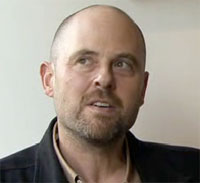Perhaps because he is a philosopher, rather than a scientist, he is open to this possibility. Whatever the reason, we need more thinking like this (even though I don't agree with all of his points).
The Problem of Consciousness - A Talk with Alva Noë
The problem of consciousness is understanding how this world is there for us. It shows up in our senses. It shows up in our thoughts. Our feelings and interests and concerns are directed to and embrace this world around us. We think, we feel, the world shows up for us. To me that's the problem of consciousness. That is a real problem that needs to be studied, and it's a special problem.A useful analogy is life. What is life? We can point to all sorts of chemical processes, metabolic processes, reproductive processes that are present where there is life. But we ask, where is the life? You don't say life is a thing inside the organism. The life is this process that the organism is participating in, a process that involves an environmental niche and dynamic selectivity. If you want to find the life, look to the dynamic of the animal's engagement with its world. The life is there. The life is not inside the animal. The life is the way the animal is in the world.
ALVA NOË is Professor of Philosophy at the University of California, Berkeley. He works principally on the philosophy of mind and cognitive science, with special interest in the theory of perception, and is also interested in the philosophy of art, the history of analytic philosophy, Phenomenology, and Wittgenstein.
THE PROBLEM OF CONSCIOUSNESS
[ALVA NOË:] The central thing that I think about is our nature, our human-animal nature, our being in this world. What is a person? What is a human being? What is consciousness? There is a tremendous amount of enthusiasm at the moment about these questions.
They are usually framed as questions about the brain, about how the brain makes consciousness happen, how the brain constitutes who we are, what we are, what we want—our behavior. The thing I find so striking is that, at the present time, we actually can't give any satisfactory explanations about the nature of human experience in terms of the functioning of the brain.
What explains this is really quite simple. You are not your brain. You have a brain, yes. But you are a living being that is connected to an environment; you are embodied, and dynamically interacting with the world. We can't explain consciousness in terms of the brain alone because consciousness doesn't happen in the brain alone.
Go to the page to read the rest and watch the video.

No comments:
Post a Comment